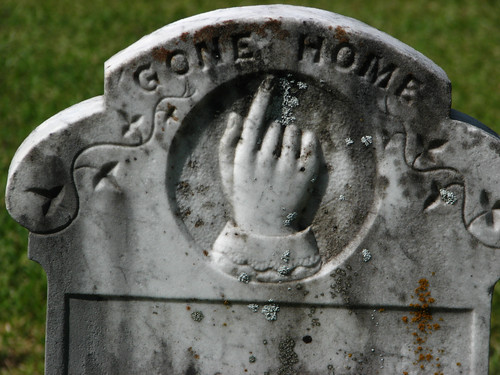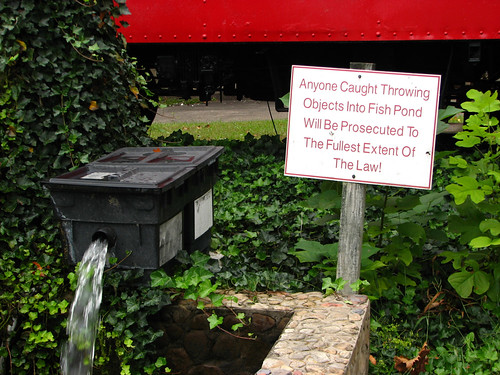I recently learned that, in the 1940s, the FBI considered the old Christmas movie, It's a Wonderful Life a piece of communist propaganda.
Of course they did.
From a 1947 FBI memo...
With regard to the picture “It’s a Wonderful Life”, [redacted] stated in substance that the film represented rather obvious attempts to discredit bankers by casting Lionel Barrymore as a “scrooge-type” so that he would be the most hated man in the picture. This, according to these sources, is a common trick used by Communists...
In addition, [redacted] stated that, in his opinion, this picture deliberately maligned the upper class, attempting to show the people who had money were mean and despicable characters...
I love this movie and its message. It's one of my favorites. I thought this Christmas morning, I'd offer one of the wonderful quotes from that wonderful old movie that the FBI apparently found questionable...
[George Bailey, speaking to the bankers about the possible closing of his father's tiny savings and loans business:]
...Why, in the 25 years since he and his brother, Uncle Billy, started this thing, he never once thought of himself. Isn't that right, Uncle Billy? He didn't save enough money to send Harry away to college, let alone me.
But he did help a few people get out of your slums, Mr. Potter, and what's wrong with that?
Why... here, you're all businessmen here. Doesn't it make them better citizens? Doesn't it make them better customers? You... you said... what'd you say a minute ago? They had to wait and save their money before they even ought to think of a decent home. Wait? Wait for what?
Until their children grow up and leave them? Until they're so old and broken down that they... Do you know how long it takes a working man to save $5,000?
Just remember this, Mr. Potter, that this rabble you're talking about... they do most of the working and paying and living and dying in this community. Well, is it too much to have them work and pay and live and die in a couple of decent rooms and a bath?
Anyway, my father didn't think so. People were human beings to him. But to you, a warped, frustrated old man, they're cattle. Well in my book, my father died a much richer man than you'll ever be!
And on an unrelated note, last year at this time, we were celebrating our kids' first self-produced CD of songs. It was made on the cheap and with some sound problems, but it was a delightful Christmas gift to us.
This year, believe it or not, the band our kids is in (Beady) is celebrating the news that they have been signed to a local recording label!
How about that?
Merry Christmas, everyone.
Sunday, December 25, 2011
It's a Wonderful Life
Thursday, December 22, 2011
The Gingrich Who Saved the Election
Words of wisdom from Newt Gingrich...
(CNN) - Asked how he plans to engage the gay community in his bid for president, Newt Gingrich on Tuesday told a voter he wouldn't be the right choice for those basing their decision on the issue of same-sex marriage.
"If that's the most important (issue) to you, then you should be for Obama," Gingrich told Scott Arnold, a man who identified himself as gay.
======
So, there you have it: IF you are gay, you SHOULD NOT VOTE for Gingrich, according to Gingrich (and, by extension, you shouldn't really vote for the GOP*).
IF you have friends, family and/or colleagues who are gay or lesbian, you shouldn't vote for Gingrich/GOP.
IF you are concerned about equal rights and justice, you should not vote for Gingrich or the GOP.
IF you believe in marriage and faithful, loving, healthy marriage commitments, you should not vote for Gingrich or the GOP.
It's not often I'll agree with a fella like Gingrich, but when he's right, he's right. I appreciate the honesty and would encourage everyone to listen to Gingrich at least on this point, where he is right on target.
=======
* CAVEAT: With the possible exception of Ron Paul who, IF he is consistent with his Libertarian leanings, is probably okay with marriage equity for all people.
There are a whole host of OTHER reasons not to vote for Ron Paul.
Friday, December 16, 2011
Christmas Memories...
This is one of my favorite photos of my beloved wife. Here's how I imagined this conversation went....
"Santa": Shuddup kids and lissen. This is how it's gonna work:
Yer not going to ask me for no presents, see? Yer just gonna sit there and smile and pretend I'm saying nice things.
My elf out there is gonna take our picture. Yer not gonna cry. If you do, there'll be hell to pay. And don't even THINK about wetting yer widdle pants while yer sitting on MY lap.
Just smile and act like everything's all right, then get off my lap and get outta here and you'll get to see your parents again.
Ya got that, ya snot-nosed brats?
Thursday, December 15, 2011
About Eight Years Too Late
The best way to end wars? Don't start them.
The angel went to Mary and said, “Greetings, you who are highly favored! The Lord is with you.”
Mary was greatly troubled at his words and wondered what kind of greeting this might be. But the angel said to her, “Do not be afraid, Mary; you have found favor with God. You will conceive and give birth to a son, and you are to call him Jesus.
He will be great and will be called the Son of the Most High. The Lord God will give him the throne of his father David, and he will reign over Jacob’s descendants forever; God's kingdom will never end...”
And Mary said:
“My soul glorifies the Lord
and my spirit rejoices in God my Savior,
for the Lord has been mindful
of the humble state of his servant.
From now on all generations will call me blessed,
for the Mighty One has done great things for me—
holy is God's name.
God's mercy extends to those who fear God,
from generation to generation.
God has performed mighty deeds with his arm;
God has scattered those who are proud in their inmost thoughts.
God has brought down rulers from their thrones
but has lifted up the humble.
God has filled the hungry with good things
but has sent the rich away empty.
God has helped his servant Israel,
remembering to be merciful
to Abraham and his descendants forever,
just as he promised our ancestors...”
For unto us a Child is born, unto us a Son is given; and the government will be upon His shoulder. And His name will be called Wonderful, Counselor, Mighty God, Everlasting Father, Prince of Peace...
...And suddenly there was with the angel a multitude of the heavenly host praising God and saying: 'Glory to God in the highest, and on earth PEACE, goodwill toward all!'
Merry Christmas. Happy Holy Days.
Tuesday, December 6, 2011
The Bible and Economics
Part of an ongoing series looking at all the many passages in the Bible that deal with wealth and poverty issues. You can see the links to the other passages in the series under the heading "The Bible and Economics" below.
Today, I'm looking at various passages in the 22nd and 23rd chapters of the book of Deuteronomy, having already explored the first 20 chapters earlier in the year.
You can see others in this series in the "Bible and Economics" link below (on the left).
If you see your fellow Israelite’s ox or sheep straying, do not ignore it but be sure to take it back to its owner.
If they do not live near you or if you do not know who owns it, take it home with you and keep it until they come looking for it. Then give it back. Do the same if you find their donkey or cloak or anything else they have lost. Do not ignore it.
If you see your fellow Israelite’s donkey or ox fallen on the road, do not ignore it. Help the owner get it to its feet...
There is just a simple teaching to remind people to be fair and responsible. "Finding" something that does not belong to you does not make it yours. In fact, you have an obligation to try to get it back to its owner.
Next, we see some rather unsavory divorce rules that were a product of their times...
If a man takes a wife and, after sleeping with her, dislikes her and slanders her and gives her a bad name, saying, “I married this woman, but when I approached her, I did not find proof of her virginity,” then the young woman’s father and mother shall bring to the town elders at the gate proof that she was a virgin.
Her father will say to the elders, “I gave my daughter in marriage to this man, but he dislikes her. Now he has slandered her and said, ‘I did not find your daughter to be a virgin.’ But here is the proof of my daughter’s virginity.”
Then her parents shall display the cloth before the elders of the town, and the elders shall take the man and punish him.
They shall fine him a hundred shekels of silver and give them to the young woman’s father, because this man has given an Israelite virgin a bad name. She shall continue to be his wife; he must not divorce her as long as he lives...
Divorce is covered a good bit in the Bible and, despite the huge difference in culture between now and then, perhaps we can see why: Women were owned. They did not have much in the way of liberty, as we count liberty today. They were not as free to just go out and get a job.
Because of that, there were protections built in for women in Israel's divorce laws. Otherwise, a man could marry, shame and kick out a woman and move on with no responsibility for the desperate economic circumstances that might leave her in.
Here is another (even more unsavory) rule in the same vein...
If a man happens to meet a virgin who is not pledged to be married and rapes her and they are discovered, he shall pay her father fifty shekels of silver. He must marry the young woman, for he has violated her. He can never divorce her as long as he lives.
Earlier, we saw that an ENGAGED woman who is raped, the rapist must be killed.. But an unengaged woman who is raped, well, the rapist just has to pay off the father for the economic damage done.
Unsavory as hell, but it touches on economic issues, so I'll post it here...
If a slave has taken refuge with you, do not hand them over to their master. Let them live among you wherever they like and in whatever town they choose. Do not oppress them...
Slavery is never overtly condemned in the Bible, but you do have passages like this one that suggest at its immorality...
Do not charge a fellow Israelite interest, whether on money or food or anything else that may earn interest. You may charge a foreigner interest, but not a fellow Israelite...
And a ruling forbidding charging a fellow Israelite interest, but charging interest to foreigners is okay.
Do you reckon that Christian bankers today think they ought to live by that same principle? Do you?
The topics of marriage/divorce, slavery and interest are all touched on in the Bible and all have greater economic ramifications. Perhaps as part of this series, I'll group some of those passages together to see what we might learn from them as a whole.
Monday, December 5, 2011
NEWT!
How long until he self-destructs?
Each GOP Presidential candidate who has taken the lead has self-destructed. How long until Newt does?
The end of the year?
The end of the week?
The end of the day?
Place yer bets...
Thursday, December 1, 2011
Did I Say That?
I have been criticized by some of those who generally agree with me for the engaging I do with those who don't agree with me/us. I don't know if folk are understanding that I'm not engaging so much for their benefit as I am mine.
Thinking Big Ideas through with those with whom I agree doesn't challenge me as much as when someone is disagreeing with me and I have to consider the Other Side. And so, by engaging with those with whom I disagree, it helps me more fully understand my position and think through if it's the position I truly think right.
Beyond that, almost without fail, when discussing these issues through with those who are opposed to my position, I almost always get a better sense of why I think I'm right. And sometimes, these disagree-ers actually provide for me with better arguments/clarifications.
Case in point: This Sabbath and "rule" discussion I've been having in various places of late.
As you can see in my previous post, I note Jesus' comment/clarification that the Sabbath is made for humanity, not humanity for the Sabbath. I think this is a key to helping us understand a right relationship with rules and community.
In noting this elsewhere, I suggested that the problem we all have at times is the sin of the Pharisees - to hold to and try to enforce rules but doing so without grace.
Along those lines, one commenter said...
One problem with Dan's use of Jesus "breaking" the Sabath. If you look at the commandment, it's pretty general. What Jesus was doing was trespassing on the Pharisee's interpretation of the commandment. In other words there is no Biblical prohibition against picking and eating grain on the Sabbath, that was a later "clarification".
What Jesus was really challenging it seems, was not even the "laws" of the Pharisee's, but the Pharisee's right to be able to make laws in the first place.
And of course, this is an extremely astute observation and one I agree with and think makes great sense.
The Pharisees were guilty of taking an Old Testament rule and enforcing not only the rule, but telling everyone else exactly what that rule meant for everyone.
Now, in the Pharisees defense, the OT rule about the Sabbath does seem fairly clear, if vague.
DO NOT WORK ON SATURDAY, the rule says. And follows up with the kicker, THOSE WHO DO SHOULD BE PUT TO DEATH.
This was a seriously serious rule, right?
And "don't work," well, that's pretty clear. Working in the field to gather food, THAT WAS working for them.
And so, the Pharisees thought they were starting from a right point, by enforcing THEIR UNDERSTANDING of a rule THEY THOUGHT was abundantly clear. THEY THOUGHT "don't glean food" was an obviously reasonable extrapolation of "don't work."
The thing is, they were wrong, according to Jesus. THEIR INTERPRETATION of the rule lacked grace and it lacked in the understanding that the Sabbath was for humanity. (And I will repeat that what was being violated was not the rule, but THEIR EXTRAPOLATED INTERPRETATION, as my commenter rightly pointed out).
The Sabbath rule WAS FOR THEIR SAKE, not some rule to beat folk over the head, but to encourage the rest - the break from work - that we need so desparately.
And so, this commenter was right, I'd say, and they agreed with my point, although I don't think they ever saw it that way.
The OT DOES say (to take a favorite issue for them), "Men shall not lie with men, kill 'em if they do..." That IS what it says. But what was the purpose of the rule? IT WAS FOR THEIR SAKE. The rule was to encourage healthy sexual practices and to discourage unhealthy (in the OT case, temple prostitution and orgies to honor a pagan god) sexual practices.
And so, the conservatives of today are RIGHT to note that the OT does have a verse that says, "men shall not lie with men," but these same conservatives err in THEIR EXTRAPOLATION of the rule given to a specific people thousands of years ago. "THIS VERSE OBVIOUSLY MEANS..." they opine (and, I'll note, it's "obvious" TO THEM, just as the "no gleaning" rule was "obvious TO THE PHARISEES) "...is that gay folk can't live in a marriage relationship that includes sex with other gay folk...").
JUST LIKE THE PHARISEES (as my commenter noted), they have taken a rule and EXTRAPOLATED OUT an EXTRA rule, and one that is lacking in grace and that lacks the understanding of the rule being FOR OUR SAKE.
If we're concerned about following God's rules for "our sake" (as Jesus noted in the Sabbath rule), then the concern is for HEALTHY SEXUAL RELATIONSHIPS, not a woodenly literal adherence to a millenia-old rule. And it is self-evident to most folk that a committed faithful marriage relationship IS the way to have healthy sexual relationships.
And so, in the paraphrased words of my detractor...
In other words there is no Biblical prohibition against healthy marriage relationships - gay or straight, that has been a later "clarification".
What Jesus was really challenging it seems, was not even the "laws" of the Pharisee's, but the Pharisee's right to be able to make laws in the first place.
So, I thank my conservative commenter for helping to clarify even better for me why my understanding is a biblically and logically and ethically solid understanding.
Tuesday, November 29, 2011
...More Like Guidelines...
I've been in several conversations in several places of late that have had a common theme that I think may be boiled down to: What is the role of rules as found in the Bible.
It has been suggested to me that the bible is a Book of Rules. I objected to that characterization. In my estimation, it would be more apt to say that the Bible is a book of Grace, or a Book of Truth (with the Truth being ultimately about Love and Grace), or a Book of God's Love for humanity, something along those lines. But "a book of rules..."?
That seems, to me, to be missing the point.
Are there rules found in the Bible? Yes, of course there are. There are rules specifically given to the Israeli people thousands of years ago. There were rules of how to "do" church in the first century AD. There are rules that can be considered universal in nature and there are rules that are obviously to a specific time and place and people.
But to call the Bible a rule book seems to be wildly missing the point.
It seems to this reader that a large part of the Bible's story of God's grace is dealing specifically with this topic. In the Old Testament, we see people hewing to the rules of sacrifice and religion and God stops them, telling them bluntly, "I desire MERCY, not Sacrifice."
They missed the point.
We see Jesus doing this repeatedly with the Pharisees, those wonderfully moral and righteous men who seemed to repeatedly miss the point, holding fastidiously, harshly fast to rules (with demands that others also hold fast to their long list of rules), but being lacking in love and grace.
I have oft-repeated what I learned growing up about understanding the Bible: We ought to interpret the whole Bible through the lens of Jesus' teachings. One of the pivotal snippets of teaching that I find in Jesus' teaching is this simple line...
The Sabbath was made for humanity, not humanity for the Sabbath.
I find this to be a pivotal, KEY teaching to understanding our relationship to rules, whether found in the Bible or elsewhere.
Consider the Sabbath rule, as found in Exodus 34...
“These are the things the LORD has commanded you to do: For six days, work is to be done, but the seventh day [Saturday] shall be your holy day, a day of sabbath rest to the LORD. Whoever does any work on it is to be put to death.”
Or, as directly quoted from Exodus 20 (ie, the Ten Commandments...)
“Remember the Sabbath day [Saturday] by keeping it holy. Six days you shall labor and do all your work, but the seventh day is a sabbath to the LORD your God. On it you shall not do any work, neither you, nor your son or daughter, nor your male or female servant, nor your animals, nor any foreigner residing in your towns..."
The rule is fairly clear and unequivocal. On SIX DAYS, we should do all our work. But on the SEVENTH DAY (Saturday), we should rest. We should NOT work on Saturday, nor should our family or people who work for us.
Clear. Easy enough to understand (although, reasonably one might question "what constitutes 'Work'?" - still, pretty clear). Straightforward.
But Jesus' helped CLARIFY the "command" for us...
One Sabbath Jesus was going through the grainfields, and as his disciples walked along, they began to pick some heads of grain. The Pharisees said to him, “Look, why are they doing what is unlawful on the Sabbath?”
He answered, “Have you never read what David did when he and his companions were hungry and in need? In the days of Abiathar the high priest, he entered the house of God and ate the consecrated bread, which is lawful only for priests to eat. And he also gave some to his companions.”
Then he said to them, "The Sabbath was made for humanity, not humanity for the Sabbath."
We travel down the path of Pharisees when we hang fastidiously to a rule without considering the context. When we condemn others for a "sin" but we're only considering the rule in a woodenly literal way and we're not considering that rule through the eyes of love, mercy and grace, we run the risk of condemning as sin, what is NOT sin.
Jesus' followers were guilty of transgressing a sin, IF we took that law woodenly literal. But that would have been missing the point. The Sabbath was made FOR US. The rules are there FOR US. for OUR sake. TO HELP.
In one of these conversations I've had lately, someone accused me of treating these COMMANDS, "more like guidelines..." (cleverly invoking the Pirates of the Caribbean running gag... "You're pirates. Hang the code, and hang the rules. They're more like guidelines anyway..."). He intended it as a slight, but yeah, maybe I DO treat them more like guidelines.
Certainly that seems to be the message of Jesus on the Sabbath rule. "You're condemning them for doing something good - eating. That 'thou shalt not work on the sabbath...' that's more like a guideline. The POINT is, that the rule is there FOR YOU, for YOUR GOOD."
THE Rule, as repeatedly summarized in the Bible (and indeed, by our own hearts) is Love God, Love your Neighbor, do Good, embrace Grace. THAT is THE HARD AND FAST RULE that we are to hold to.
The "rules" (lowercase "rule"), they're more like guidelines. They are there for our benefit, to help guide us in the paths of Love and Grace.
Yes, prostitution is not good for the oppressed prostitute or the needy/oppressive john. That is the guideline. BUT, in the Bible, we see the story of Tamar, who USED prostitution to take a stand against Injustice and for Good, for Love, for Grace. Thus, she "broke" the "rule"/guideline in an effort to hold close to THE Rule - Love, Grace.
We see this in David and the disciples "working on the Sabbath." Breaking the "rule" to hold fast to the "RULE."
We see this in Jesus healing on the Sabbath, breaking the "rule" to hold fast to the "RULE."
We see the pharisees MISSING the point in their heaping of rules upon rules on the shoulders of their followers, but missing out on grace.
We see the Israelis missing the point in their adherance to giving sacrifice, but their lacking in mercy.
The "rules" are there FOR OUR SAKE, to help us walk in the RULE of Grace, of Love, of Mercy and Justice.
And, for that reason, it seems to me that we too often have made the Bible into a mere rulebook and missed the point of the Story: Living into Grace.
Tuesday, November 22, 2011
Theology for the Social Gospel
When I was a much younger man, I was fairly strongly influenced by a work of fiction called, In His Steps, by Charles Sheldon. It's a book published in 1897 and influenced by the Social Gospel Movement of the day. While many are unfamiliar directly with the book, they are aware of it secondarily through the WWJD phenomena. The now-rather-trite bracelets, etc, of the last few years that supposedly serve as a reminder, "What Would Jesus Do?" gets the catchphrase from Sheldon's book.
The story in the book tells of how a preacher and some in his well-to-do church were influenced by the radical notion of not taking any action without first asking, "What Would Jesus Do in this situation?" and then acting accordingly.
Although I did not know it at the time, Sheldon was influenced by prominent "social gospel" theologian, Walter Rauschenbusch. The book was his way of furthering that message.
And what was the message of the Social Gospel (much maligned in some circles today)? According to Merriam Webster, simply this:
the application of Christian principles to social problems
Other common definitions fall along these lines...
The Social Gospel was an early 20th century Protestant Christian movement which placed its emphasis on the application of Christian principles to society's problems.
Not so radical, one would think. And yet, apparently it is revolutionary, at least some might say.
I say all that by way of introducing some of Rauschenbusch's own words on the topic, from his A Theology for the Social Gospel (1917)...
The social gospel is the old message of salvation, but enlarged and intensified. The individualistic gospel has taught us to see the sinfulness of every human heart and has inspired us with faith in the willingness and power of God to save every soul that comes to him. But it has not given us an adequate understanding of the sinfulness of the social order and its share in the
sins of all individuals within it. It has not evoked faith in the will and power of God to redeem the permanent institutions of human society from their inherited guilt of oppression and extortion.
Both our sense of sin and our faith in salvation have fallen short of the realities under its teaching. The social gospel seeks to bring men under repentance for their collective sins and to create a more sensitive and more modern conscience. It calls on us for the faith of the old prophets who believed in the salvation of nations...
Theology is not superior to the gospel. It exists to aid the preaching of salvation. Its business is to make the essential facts and principles of Christianity so simple and clear, so adequate and mighty, that all who preach or teach the gospel, both ministers and laymen, can draw on its stores and deliver a complete and unclouded Christian message. When the progress of humanity creates new tasks, such as world-wide missions, or new problems, such as the social problem, theology must connect these with the old fundamentals of our faith and make them Christian tasks and problems...
On the other hand the idea of the redemption of the social organism is nothing alien. It is simply a proper part of the Christian faith in redemption from sin and evil. As soon as the desire for salvation becomes strong and intelligent enough to look beyond the personal sins of the individual, and to discern how our personality in its intake and output is connected with social groups to which we belong, the problem of social redemption is before us and we can never again forget it. It lies like a larger concentric circle around a smaller one. It is related to our intimate personal salvation like astronomy to physics. Only spiritual and intellectual immaturity have kept us from seeing it clearly before. The social gospel is not an alien element in theology...
Neither is it novel. The social gospel is, in fact, the oldest gospel of all. It is “built on the foundation of the apostles and prophets.” Its substance is the Hebrew faith which Jesus himself held. If the prophets ever talked about the “plan of redemption,” they meant the social redemption of the nation.
So long as John the Baptist and Jesus were proclaiming the gospel, the Kingdom of God was its central word, and the ethical teaching of both, which was their practical commentary and definition of the Kingdom idea, looked toward a higher social order in which new ethical standards would become practicable. To the first generation of disciples the hope of the Lord’s return meant the hope of a Christian social order on earth under the personal rule of Jesus Christ, and they would have been amazed if they had learned that this hope was to be motioned out of theology and other ideas substituted...
The doctrine of the Kingdom of God was left undeveloped by individualistic theology and finally mislaid by it almost completely, because it did not support nor fit in with that scheme of doctrine. In the older handbooks of theology it is scarcely mentioned, except in the chapters on eschatology; in none of them does it dominate the table of contents.
What a spectacle, that the original teaching of our Lord has become an incongruous element in so-called evangelical theology, like a stranger with whom the other doctrines would not associate, and who was finally ejected because he had no wedding garment!
In the same way the distinctive ethics of Jesus, which is part and parcel of his Kingdom doctrine, was long the hidden treasure of the suppressed democratic sects. Now, as soon as the social gospel began once more to be preached in our own time, the doctrine of the Kingdom was immediately loved and proclaimed afresh, and the ethical principles of Jesus are once more taught without reservation as the only alternative for the greedy ethics of capitalism and militarism. These antipathies and affinities are a strong proof that the social gospel is neither alien nor novel, but is a revival of the earliest doctrines of Christianity, of its radical ethical spirit, and of its revolutionary consciousness.
Monday, November 14, 2011
Ol' Axeman Jesse
On the top of the mountain
there is a clearing
and from that clearing,
you can see as far as you'd like
but only when the leaves are gone
and the summer is ended.
Sunday, November 6, 2011
Laughlin Boy
but he would not fire a rifle so he sat in a cold jail cell
so he sat in a cold jail cell
he was pierced and he was beaten forty stripes he gladly bore
but he would not serve the devil in that awful civil war
in that awful civil war
listen to me children, well i wouldn't tell a lie
listen to me children, well i wouldn't tell a lie
twelve grey soldiers stood before him and they aimed their rifles true
he prayed lord, oh please forgive them for they know not what they do
for they know not what they do
those young soldiers would not fire they defied the general's plan
so the army changed his sentence who could murder such a man?
who could murder such a man?
listen to me children, well i wouldn't tell a lie
listen to me children, well i wouldn't tell a lie
they hauled him far away to richmond far away from his kids and wife
there, pneumonia wracked his body that good man soon lost his life
that good man soon lost his life
now his wife is sadly weeping seven children wonder why
lord it seems that truth and honor sure can come at an awful price
sure can come at an awful price
listen to me children, well i wouldn't tell a lie
listen to me children, well i wouldn't tell a lie
oh, have you heard many a story told by old and young with joy
about the faithful deed of daring that was done by the laughlin boy
that was done by the laughlin boy
Wednesday, November 2, 2011
Saturday, October 29, 2011
Protesting Wall Street?
Because they rob the weak, and the needy groan, I will now arise," says the LORD; "I will grant safety to whoever longs for it...
They would crush the hopes of the poor, but the poor have the LORD as their refuge...
LORD, who may abide in your tent? Who may dwell on your holy mountain?
Whoever walks without blame, doing what is right, speaking truth from the heart; Who does not slander a neighbor, does no harm to another, never defames a friend; Who keeps an oath despite the cost, lends no money at interest, accepts no bribe against the innocent...
Arrogant scoundrels pursue the poor; they trap them by their cunning schemes.
The wicked even boast of their greed; these robbers curse and scorn the LORD...
They wait in ambush near towns; their eyes watch for the helpless. to murder the innocent in secret.
They lurk in ambush like lions in a thicket, hide there to trap the poor, snare them and close the net.
The helpless are crushed, laid low; they fall into the power of the wicked...
Rise up, LORD God! Raise your arm! Do not forget the poor!
You listen, LORD, to the needs of the poor; you encourage them and hear their prayers.
For the rich men of the city are full of violence,
Her residents speak lies,
And their tongue is deceitful in their mouth…
Hear this, you who trample the needy, to do away with the humble of the land, saying,
“When will the new moon be over,
So that we may sell grain,
And the sabbath, that we may open the wheat market,
To make the bushel smaller and the shekel bigger,
And to cheat with dishonest scales,
So as to buy the helpless for money
And the needy for a pair of sandals,
And that we may sell the refuse of the wheat?”...
You win justice for the orphaned and oppressed; no one on earth will cause terror again.
Listen, my beloved brothers. Did not God choose those who are poor in the world to be rich in faith and heirs of the kingdom that he promised to those who love him? But you dishonored the poor person. Are not the rich oppressing you? And do they themselves not haul you off to court? Is it not they who blaspheme the noble name that was invoked over you?...
Come now, you rich, weep and wail over your impending miseries. Your wealth has rotted away, your clothes have become moth-eaten, your gold and silver have corroded, and that corrosion will be a testimony against you; it will devour your flesh like a fire. You have stored up treasure for the last days.
Behold, the wages you withheld from the workers who harvested your fields are crying aloud, and the cries of the harvesters have reached the ears of the Lord of hosts.
You have lived on earth in luxury and pleasure; you have fattened your hearts for the day of slaughter. You have condemned; you have murdered the righteous one; he offers you no resistance...
God has brought down rulers from their thrones,
And has exalted those who were humble.
GOD HAS FILLED THE HUNGRY WITH GOOD THINGS;
And sent away the rich empty-handed...
Woe to you who are rich...
"Sell your belongings and give alms. Provide money bags for yourselves that do not wear out, an inexhaustible treasure in heaven that no thief can reach nor moth destroy.
"For where your treasure is, there also will your heart be."
Sunday, October 23, 2011
The Bible and Economics
Part of an ongoing series looking at all the many passages in the Bible that deal with wealth and poverty issues. You can see the links to the other passages in the series under the heading "The Bible and Economics" below.
Today, I'm looking at Exodus 16, which is the passage that tells about the children of Israel being provided heavenly manna to eat to keep them alive while roaming through the wilderness. The Israelites had just escaped slavery in Egypt and the crossing of the Red Sea, but they found themselves without enough food to survive. They soon started complaining...
The Israelites said to them, “If only we had died by the LORD’s hand in Egypt! There we sat around pots of meat and ate all the food we wanted, but you have brought us out into this desert to starve this entire assembly to death.”
God saves them by providing manna and quail from heaven...
Then the LORD said to Moses, “I will rain down bread from heaven for you. The people are to go out each day and gather enough for that day.
In this way I will test them and see whether they will follow my instructions. On the sixth day they are to prepare what they bring in, and that is to be twice as much as they gather on the other days...”
The LORD said to Moses, “I have heard the grumbling of the Israelites. Tell them, ‘At twilight you will eat meat, and in the morning you will be filled with bread. Then you will know that I am the LORD your God.’”
That evening quail came and covered the camp, and in the morning there was a layer of dew around the camp. When the dew was gone, thin flakes like frost on the ground appeared on the desert floor.
When the Israelites saw it, they said to each other, “What is it?” For they did not know what it was.
NOTE: "Manna" sounds like the Hebrew term for "What is it?"
Moses said to them, “It is the bread the LORD has given you to eat. This is what the LORD has commanded: ‘Everyone is to gather as much as they need...
The Israelites did as they were told; some gathered much, some little. And when they measured it by the omer, the one who gathered much did not have too much, and the one who gathered little did not have too little. Everyone had gathered just as much as they needed.
Then Moses said to them, “No one is to keep any of it until morning.”
However, some of them paid no attention to Moses; they kept part of it until morning, but it was full of maggots and began to smell...
The Israelites ate manna forty years, until they came to a land that was settled; they ate manna until they reached the border of Canaan.
This story is especially significant because it establishes some principles that are echoed throughout the Bible:
Just take what you need;
Don't try to take more than you need - it will only rot;
In this economy of Enough, those who collect much have enough and no more, and those who collect little have enough and no more;
Observe the Sabbath - a day of rest from storing up your "enough."
Thursday, October 13, 2011
Cleaning Shippingport Island
This weekend, some of the teens from church went to Shippingport Island to clean off the garbage that daily washes ashore and I was privileged to go along with them. I've been to the island before, but the trip reminded me of what a cool place it is.
Shippingport Island was originally just Shippingport - the little village immediately west of the city of Louisville. It became an island in 1830, when a canal was built, cutting off Shippingport into its own little island. Louisville was settled at its location because there were a series of waterfalls/rapids on the Ohio River which made river navigation very difficult (many of the old maps of the Falls show little shipwrecked boats to indicate how treacherous it was). The dam and canal were built in order to tame that portion of the Ohio River and make it navigable.
Eventually, the village at Shippingport was abandoned, but it had quite a history while it lasted. One little bit of that history involves, indirectly, my own church. The church from which we sprang - the Union Gospel Mission - was founded by a former riverboat gambler, murderer and all around scoundrel named Steve Holcombe. Holcombe was raised on Shippingport Island and his father was buried there.
Holcombe and his mission to the "least of these" of his day achieved a bit of notoriety back when it began in the 1880s and 1890s. Eventually, Holcombe's biography/story was written and published.
As I walked and worked on Shippingport last Saturday, I reflected on Holcombe walking those same shores and thought it would be worthwhile to post an excerpt from his biography. It really is a fascinating story, maybe I'll post other excerpts at a later date.
Here then, from the book, "Steve P. Holcombe, the Converted Gambler: His Life and Work..."
Shippingport Island and Steve Holcombe
STEVE P. HOLCOMBE, known in former years as a gambler and doer of all evil, no less known in these latter days as a preacher of the Gospel and doer of all good, was born at Shippingsport, Kentucky, in 1835.
The place, as well as the man, has an interesting history. An odd, straggling, tired, little old town, it looks as if it had been left behind and had long ago given up all hope of ever catching up. It is in this and other respects in striking contrast with its surroundings. The triangular island, upon which it is situated, lies lazily between the Ohio river, which flows like a torrent around two sides of it, and the Louisville canal, which stretches straight as an arrow along the third. On its northeast side it commands a view of the most picturesque part of La Belle Riviere.
This part embraces the rapids, or “Falls,” opposite the city of Louisville, which gets its surname of “Falls City” from this circumstance. In the midst of the rapids a lone, little island of bare rocks rises sheer out of the dashing waters to the height of several feet, and across the wide expanse, on the other side of the river, loom up - the wooded banks of the Indiana side, indented with many a romantic cove, and sweeping around with a graceful curve, while the chimneys and towers and spires of Jeffersonville and New Albany rise in the distance, with the blue Indiana “Knobs” in the deep background beyond.
From this same point on the island, and forming part of the same extensive view, one may see the two majestic bridges, each a mile in length, one of which spans the river directly over the Falls and connects the city of Louisville with Jeffersonville, Indiana, while the other joins the western portion of Louisville with the thriving city of New Albany. Across the canal from the island, on the south, lies the city of Louisville with its near 200,000 population, its broad avenues, its palatial buildings.
In the very midst of all this profusion of beauty and all this hum and buzz and rush of commercial and social life, lies the dingy, sleepy old town of Shippingsport with its three hundred or four hundred people, all unheeded and unheeding, uncared for and uncaring.
There are five or six fairly good houses, and all the rest are poor. There is a good brick schoolhouse, built and kept up by the city of Louisville, of which, since 1842, Shippingsport is an incorporated part. There is one dilapidated, sad looking, little old brick church, which seldom suffers any sort of disturbance. On the north-east shore of the island directly over the rushing waters stands the picturesque old mill built by Tarascon in the early part of the century.
It utilizes the fine water-power of the “Falls” in making the famous Louisville cement. Part of the inhabitants are employed as laborers in this mill, and part of them derive their support from fishing in the river, for which there are exceptional opportunities all the year around in the shallows, where the rushing waters dash, with eddying whirl, against the rocky shores of their island.
There are, at this time, some excellent people in Shippingsport, who faithfully maintain spiritual life and good moral character amid surrounding apathy and immorality. “For except the Lord had left unto them a very small remnant, they should have been as Sodom, and they should have been like unto Gomorrah.”
And yet, Shippingsport was not always what it is now. Time was when it boasted the aristocracy of the Falls. “The house is still standing,” says a recent writer in Harper’s Monthly Magazine, “where in the early part of the century the Frenchman, Tarascon, offered border hospitality to many distinguished guests, among whom were Aaron Burr and Blennerhasset, and General Wilkinson, then in command of the armies of the United States.”
He might have added that Shippingsport was once honored with a visit from LaFayette, and later also from President Jackson. But in other respects also Shippingsport was, in former years, far different from what it is today. In business importance it rivaled the city of Louisville itself. In that early day, before the building of the canal, steamboats could not, on account of the Falls, pass up the river except during high water, so that for about nine months in the year Shippingsport was the head of navigation. Naturally, it became a place of considerable commercial importance, as the shrewd Frenchman who first settled there saw it was bound to be.
Very soon it attracted a population of some hundreds, and grew into a very busy little mart. “Every day,” says one of the old citizens still living, “steamboats were landing with products and passengers from the South, or leaving with products and passengers from Kentucky and the upper country.”
The freight which was landed at Shippingsport was carried by wagons and drays to Louisville, Lexington and other places in Kentucky and Indiana. This same old citizen, Mr. Alex Folwell, declares that he has seen as many as five hundred wagons in one day in and around the place. There were three large warehouses and several stores, and what seems hard to believe, land sold in some instances for $100 per foot.
The canal was begun in 1824, the first spadeful of dirt being taken out by DeWitt Clinton, of New York. During the next six years from five hundred to a thousand men were employed on it. They were, as a general thing, a rough set. Sometimes, while steamboats were lying at the place, the unemployed hands would annoy the workmen on the canal so that gradually there grew up a feeling of enmity between the two classes which broke out occasionally in regular battles.
In 1830, when the canal was finished, the days of Shippingsport’s prosperity were numbered. Thenceforth steamboats, independent of obstructions in the river, passed on up through the canal, and Shippingsport found her occupation was gone. The better classes lost no time in removing to other places, and only the poorer and rougher classes remained.
Many of the workmen who had been engaged in building the canal settled down there to live; unemployed and broken-down steamboatmen gravitated to the place where they always had such good times; shiftless and thriftless poor people from other places came flocking in as to a poor man’s paradise.
Within easy reach of Louisville, the place became a resort for the immoral young men, the gamblers and all the rough characters of that growing city.
Such was the place to which Steve Holcombe’s parents removed from Central Kentucky in 1835, the year of his birth; and, though coming into the midst of surroundings so full of moral perils, they did not bring that strength of moral character, that fixedness of moral habit and that steadfastness of moral purpose which were necessary to guard against the temptations of every sort which were awaiting them.
The father, though an honest and well disposed sort of man and very kind to his family, was already a drunkard. His son says of him: “My poor father had gotten to be a confirmed drunkard before I was born, and after he had settled at Shippingsport, my mother would not let him stay about the house, so that most of his time was spent in lying around bar-rooms or out on the commons, where he usually slept all times of the year.”
It is not surprising that as a consequence of such dissipation and such exposure he died at the early age of thirty-three, when his son Steve was eleven years old.
Dead, he sleeps in an unmarked grave on the commons where formerly he slept when drunk and shut out by his wife from his home...
From Steve P. Holcombe, the Converted Gambler: His Life and Work, published in 1888 by the Press of the Courier Journal Job Printing Company. Reprints available here
Monday, October 3, 2011
Irony of the Year Award Nominee
As part of the mountain top removal tour I mentioned in my last post, we stopped at a miners' memorial park in Eastern Kentucky. The park was built with funds raised by contributions, including from coal companies.
As part of the park, there was a lovely fountain, running with clean, clear water (pictured here) and the Amazing Irony Sign: ANYONE CAUGHT THROWING OBJECTS INTO FISH POND WILL BE PROSECUTED...
So, let's think about that: Blowing up MOUNTAIN TOPS, dumping the waste from that (including toxins and heavy metals) into the valley and streams below, they WANT that to be legal, but tossing a penny into a water fountain will be prosecuted to the fullest extent of the law???
Irony is alive and doing just fine, thank ye.
Sunday, October 2, 2011
Mountain Top Removal Tour
I went on a short trip this weekend to do a quick tour of Black Mountain - the highest point in Kentucky - and of the neighboring mountain that has been devastated by the mountain top removal method of coal mining, which is what you see in the photo.
We also met with some folk (former miners, as it turns out) whose own homes have been damaged/threatened by nearby mining operations. Some of the quotes (roughly) from these folk living with MTR...
"It's state-sponsored destruction..."
"When they were getting to start mining above my house, I was warned that it might cause damage. 'I'm not worried,' I told them, 'There are laws in place to protect me...' And there WERE/ARE laws in place, but they didn't protect me. Laws are only good as their enforcement..."
The rest of his story, I can't quote, but went something like this:
I had built a fishing pond on my land. When I got hurt mining and ended up on disability, I couldn't go out and fish - or take my grandkids fishing - like I used to. So I spent thousands of dollars building and stocking this pond.
Then they started mining up above me and soon, my 11-15 foot deep pond was filled with run-off silt and I had dead fish floating in my pond.
I tried calling the appropriate authorities and, at first, the mine company denied it. Then they looked into it and said the pond wasn't even on my own property (it was). Eventually, they owned up to the problem and said that, in about 10 or 12 years, they could make things right.
In 10-12 years, I may well be dead and my grandkids will be grown! That was no solution.
The mining company DID get fined (a few thousand dollars) by the authorities, but none of that money came to me. It didn't stop their irresponsible practices and it didn't restore my losses.
I learned that the laws aren't any good unless they're enforced.
The problem is, here in Appalachia, we're just hillbillies. We can be ignored and no one will care. Our land and people can be damaged and no one will care. The mining companies will be - at best - fined a pittance and just keep with the same damaging practices.
If this were the Smoky Mountains, or the Rocky Mountains, no one would stand for this sort of devastation to the local land or people, but that's why we need you all in Louisville, in Lexington or other places that "matter" to speak out on our behalf.
We have to work together to make this right...
Wednesday, September 28, 2011
"We Deserve to Die. Horribly." Really??
Okay, here you can answer the question. And I know we've covered much of this ground fairly recently, I'm just taking another shot at it.
Recently, I've read a more conservative fellow make the suggestion...
"When asked about the Galileans killed by Pilate, He assured His listeners, "Do you think that these Galileans were worse sinners than all the other Galileans, because they suffered in this way? No, I tell you; but unless you repent, you will all likewise perish" (Luke 13:2-3). The message? Everyone deserves to die. Horribly. Without mercy. Even me. Even you. That is not mean or evil or unkind. It is justice."
The context of that quote was the writer was speaking of God's command to Israel to attack and destroy Amalekite, a nation that had been quite evil in its dealings with Israel. The key passage in question was from 1 Samuel 15...
""Thus says the LORD of hosts, 'I have noted what Amalek did to Israel in opposing them on the way when they came up out of Egypt. Now go and strike Amalek and devote to destruction all that they have. Do not spare them, but kill both man and woman, child AND INFANT, ox and sheep, camel and donkey'"" [emphases mine]
Here we have that idea that a literal reading of this passage has one advocating a God who, AT LEAST AT TIMES, might command a people to kill infants. This is rather a shocking notion for a God of perfect love and perfect justice. Thus, this blogger had made the attempt to explain it by saying, "EVERYONE deserves to die. Horribly. Without mercy... That is not mean or evil or unkind. It is justice."
Again, his words.
My question (open to all, but especially our more conservative friends) in response to this rather astounding proposition:
1. Do you agree? Do we ALL deserve to die horribly and without mercy?
2. Do you think that one day old infants deserve to die horribly and without mercy?
3. IF SO, why?
What has a one day old infant done (or NOT done) that would suggest that they deserve to die horribly?
4. How is justice served by a one day old infant being killed horribly and without mercy?
Or, let's take it another way. Let's say that you can AGREE with me that a one day infant does not "deserve to die horribly," that this is YOUR opinion as a fellow human and Christian.
Nonetheless, some might argue that while THEY PERSONALLY don't think an infant should die without mercy, that God MIGHT think so.
If so,
5. Do you think that GOD thinks that we all deserve to die horribly, without mercy?
6. Do you think thta GOD thinks that a one day old infant deserves to die horribly, without mercy?
Note: I'm NOT asking if you think a one day old infant is a sinner. I'm not asking if you think God will ask YOU to kill an infant. I'm asking just the questions I've asked.
While I'm at it, this other fella insisted (or at least appeared to insist) that because the Bible says a infant can lie, that this means that a one day infant lies. The Bible says that is the case, therefore it must BE the case.
The passage in question is Psalm 58, where the Psalmist is writing a song about "the wicked" and unjust rulers...
Even from birth the wicked go astray;
from the womb they are wayward, spreading lies.
Now, to me, this is obviously not a literal fact, but a poetic bit of hyperbole. Nonetheless, this other fella appeared to disagree, holding to the "if it says it, I'll believe it's literal until I have some reason to think it's NOT literal..." and my "it's obviously poetic hyperbole" is not reason enough to think it isn't literal.
So, a final question:
7. In what way is an infant "from the womb" spreading lies?
Any answers to these questions would be appreciated.
If you are going to say something other than an answer to these questions, please begin with "THIS IS NOT AN ANSWER TO THESE QUESTIONS..." and a brief summation of what you ARE addressing (ie, it might be reasonable to say, "This is not an answer to these questions, but rather, I'd like to point out WHY the questions are not reasonable questions..." if you could make such a case. Otherwise, you'll be off topic and likely ignored.)
No, no, no
I have a question about HOW to conduct conversation and I'd like to post an example of how a real conversation proceeded, to serve as a reference point. My question in THIS post is not about the topic being discussed, but about how to get a straight answer to a reasonable question. My next post, I'll entertain answers on the topic.
So, recently one of our conservative friends had a post all about Israel's attack of the Amalekites found in the OT. This is one of those stories where it appears God is commanding Israel to wipe out everyone in the city - including the children and infants. In striving to justify a literal interpretation of this passage, this writer stated a point which I tried to ask about.
Below, I have copied and pasted the pertinent parts of our conversation. I'm just wondering what I could have done to successfully communicated with this person, to successfully get an answer to a reasonable question. This is how our conversation went (with him in italics and me in bold)...
He said on his blog entry:
Everyone deserves to die. Horribly. Without mercy. Even me. Even you. That is not mean or evil or unkind. It is justice.
I emailed, asking:
So WHERE, in the Amalekite story, do you see the justice of killing infants? What did they do to "deserve to die..." "Horribly"?
I'd be interested in your answer.
Note: I have made no accusation. I have not called him wrong or mistaken. I have not called him names or doubted his Christian faith. He simply stated that everyone deserves to die. Horribly. HIS words.
To which I responded with the I-think reasonable question to such a position: Where in the story cited was the justice in killing infants? I was wanting his answer to THAT question. The conversation continued via email...
In answer, then, to your question, I obviously believe that all human beings are sinners, justly condemned, because they do not seek first the kingdom of God, do not seek first the glory of God, do not operate first from faith. That's my answer. I don't think it's vague or evasive.
???
My question was...
So WHERE, in the Amalekite story, do you see the justice of killing infants? What did they do to "deserve to die..." "Horribly"?
And you are saying that because a ONE DAY OLD INFANT has not chosen to seek first God's kingdom, they deserve to die a horrible death? Is that your actual position?
Note: I THINK I see his answer to my question, but since it seems rather hard to believe, I repeat what I think his answer is and ask him if, indeed that is his answer...
Since you and I DISAGREE that "sin" is defined as a willful rebellion, a knowing act against a known right/wrong, then, of course, we don't agree from the start. You see "choose" as one key component of "sin" and I do not. Frankly, neither does the Bible, but that's neither here nor there. In order for me to agree with you, I would have to redefine sin to coincide with your definition. Do you not see that, as I have repeatedly stated, we do not agree AT THE BASE? Our disagreement starts long before the Amalekite question.
Okay, what if we look at this apparent disagreement for a minute, if you'd like...
From the Bible answer website, "Got Questions?" we get this information about sin...
"Sin is described in the Bible as transgression of the law of God (1 John 3:4) and rebellion against God (Deuteronomy 9:7; Joshua 1:18)."
Do you agree that these are good, solid biblical understandings of "sin"? That sin is transgressing God's law?
That sin is rebellion against God?
If so, how do you think a newborn babe rebels against God? How do you think a babe transgresses God's law?
Let's see ... you complain that I don't answer your questions directly. Going to your questions directly ...
"Do you agree that these are good, solid biblical understandings of 'sin'?" No.
"That sin is transgressing God's law?" No.
"That sin is rebellion against God?" No.
I think that "Got Questions" got it wrong. 1 John 3:4 does not say that sin is the transgression of the law of God. It says, "Sin is lawlessness".
...John wrote "Sin is lawlessness." (See ESV, NASB, NIV, Green's Literal Translation, Young's Literal Translation, oh, just about any translation at all including the New King James, with the apparent sole exception of the King James.) Sin is the absence of God's Law. Therefore, I disagree with you and with "Got Questions" and I agree with Paul, the psalmist, Isaiah, John, and others...
I am agreeing that newborns or even infants have not murdered or committed adultery or the like, but it is inconceivable that you would argue that they actively and fully operate to the glory of God, work from faith, or love God with their entire being. The biblical definition of sin is lawlessness. That is the absence of God's Law. I don't see how an infant can be defined as operating on anything but that absence. Or, to put it in the terms you've been suggesting, sin is not the choice to violate God's Law and, as long as that Law is not violated, has not occurred. Sin is the the absence of perfect submission to God's Law. Righteousness is active, not merely the absence of sin.
I apologize for my lack of understanding here, So if I may clarify... When I ask:
In what way do you think these infants are lawless and thus, deserving of a horrible death?
Your answer is that because infants do not - at the age of, say, one day old - do not "actively and fully operate to the glory of God," that this is lawlessness and deserving of a horrible death?
I'm just trying to get a clear understanding of your position.
Yeah, I get that you don't get it ... because your idea is that they are innocent and my idea is that God in all His glory deserves to be glorified and honored and loved from the birth of one of His creations. You are unable to understand this idea because you cannot define "sin" as anything but "violating God's law". As long as "sin" is "something I choose to do to violate God's law" as your premise, then none of this will make any sense to you. Oddly enough, despite my constant attempts to explain that disparity between how I see the biblical definition of sin and how you are defining it, you can't seem to see it. Either that or (as I highly suspect not because of simply Dan Trabue, but because of human nature) your view of God is fairly tame ... kind of like I indicated in the post.
NOTE: At this point, I have not offered any opinions about infants or their innocence in this conversation. I have not offered my opinions about sin. I've just asked a question in various ways trying to get a clear answer. I THOUGHT when I quoted him, I'd be able to get a "Yes, that IS my position," but no.
I continued...
I'm just trying to get a straightforward answer to a straightforward question.
When I ask:
in what way do you think these infants are lawless and thus, deserving of a horrible death?
Your answer is...
because infants do not - at the age of, say, one day old - do not actively and fully operate to the glory of God, that this is lawlessness and deserving of a horrible death...
IS THAT YOUR POSITION? If not, could you please re-state your answer to THAT ^ question for me?
Because infants are lawless.
Again, I'm sorry. Maybe I'm not asking the question right. I'm wondering IN WHAT WAY do you think infants are lawless?
What does a "lawless" infant look like?
What are they doing that indicates they are lawless and, thus deserving of a horrible death?
Thanks...
Apparently I lack the words in the English language to express a thought that you can comprehend. I've explained it as a lack of law. I've explained it as the absence of God's law. I've explained that righteousness is active, not merely passive. I've explained that sin is not active violation, but the absence of God's Law.
And so, I summed up your position thusly...
because infants do not - at the age of, say, one day old - do not actively and fully operate to the glory of God, that this is lawlessness and deserving of a horrible death...
Is my summation incorrect? It refers to what is absent (ie, "they DO NOT actively and fully operate to the glory of God"), not what they do.
So, is my summation (which, after all, comes from your direct words) correct? Because infants do not actively operate to the glory of God, they are deserving of a horrible death?
They do not love God. They do not glorify God. They ... according to the Bible ... tell lies. But, of course, you're still operating on the do concept. What do they do that is sin. I am speaking of the absence of the Law in them. They do not love God or glorify Him as a result of this absence. You're talking about what they do and I'm talking about what they lack. That's why your summation falls short. There is no positive righteousness in an infant.
And my question remains: How do you TELL there is an "absence of law in them..."? What does that look like? Or are you just saying, "I KNOW there's an absence of law in them, take my word for it..."?
As to "there is no positive righteousness in an infant," would it then be fair to sum up your position as:
Because there is NO POSITIVE RIGHTEOUSNESS in a newborn infant (ie, they haven't done anything 'good,'), they deserve to die a horrible death?
I guess I might also ask, what do you mean by positive righteousness? Merely that they haven't done anything righteous at one day old?
...Also, "according to the bible," a one day old infant TELLS LIES? Do you really think this is true? (ie, both that the Bible teaches that and that a one day old infant is capable of telling lies?)
I get it. It won't be getting through. There is a language barrier or something, a fundamental disconnect. That the Bible says they lie from the womb and that there is not a single one righteous and that all have sinned all favor my view. That sin is defined as the absence of law favors my view. That the Church has historically declared this to be so favors my view... These facts, however, are irrelevant. I cannot get this across to you. You cannot think in terms of anything except "what they do". Even in the attempt to use "positive righteousness" you ask "that they haven't done anything...?"
You don't like that I threw in "that they haven't done anything..."? Then say so and throw it out and answer the question I asked with that revision.
Here, let me ask again without that line, using mostly your own words...
Because "there is NO POSITIVE RIGHTEOUSNESS in a [newborn] infant", they "deserve to die" "horribly" - IS THAT YOUR POSITION?
You can see that those are mostly your own words, I'm just restating it to see if I'm understanding you correctly.
I've answered your question repeatedly. You just don't accept the answer. My answer is that all human beings are sinners, that this includes infants, that the Bible says this is the case. My answer is that infants are also sinners, that there is only one, singular-for-all-of-history exception to that fact, and that would be Jesus. My answer is that infants violate the command of God to glorify Him, they lie from their mothers' wombs, they fail to love God with all their hearts. My answer is that infants and toddlers and children and teens and adults are sinners at their very core. And my answer is that God is so perfect, so high, so holy, so inviolable that any transgression or failure or omission or inaction on the part of His creation merits the penalty of eternal death.
Does my position (my position that is the historic position of the Church, the Bible, the Anabaptists, etc.) sound horrible? Undoubtedly. It probably sounds like foolishness on one hand and an offense on the other ... you know, like the Bible says it would. So I'm not equivocating and I'm not avoiding answering direct questions (a favorite mindless accusation of yours for which I would recommend you look to yourself) because of that. You're just not seeing the answers as clearly as they're given. And the Bible has an explanation for that, too.
"I've answered your question repeatedly. You just don't accept the answer."
But you haven't, not directly. Allow me to demonstrate and, if you can see that you are answering questions that I haven't asked, maybe you'll try to answer the question I DID ask.
Here is what YOU say your answers are...
"My answer is that all human beings are sinners, that this includes infants, that the Bible says this is the case."
And that WOULD be an answer to the question, "Are all human beings sinners?" But THAT WAS NOT MY QUESTION...
"My answer is that infants are also sinners, that there is only one, singular-for-all-of-history exception to that fact, and that would be Jesus."
And that WOULD be an answer to the question, "Are infants sinners?" But THAT WAS NOT MY QUESTION...
"My answer is that infants violate the command of God to glorify Him, they lie from their mothers' wombs, they fail to love God with all their hearts."
This might be closer. My actual question was:
BECAUSE "THERE NO POSITIVE RIGHTEOUSNESS IN A [NEWBORN] INFANT", THEY "DESERVE TO DIE" "HORRIBLY" - IS THAT YOUR POSITION?
and so, are you saying your answer (YOUR WORDS) to THIS question is
No, it is NOT my position that because there is no positive righteousness in newborn infants, they deserve to die a horrible death. Rather my position is "[BECAUSE] infants violate the command of God to glorify Him, they lie from their mothers' wombs, they fail to love God with all their hearts..." they deserve to die horribly."
Is THAT the answer to the question asked?
the reason I do not take the bold-faced question you ask and repeat it back to you with a "yes" or a "no" is because you have made it into a simplistic, false statement (read "lie"). You did it (repeatedly) with the whole "So, you believe that God approves of killing your enemies' children?" A lie. It is a naked, out of context, unexplained and therefore misunderstood statement. You were so very quick to misquote me before ("I only took your words and put them out there"). It will not go well here, either.
Do I think that everyone ought to die horribly? Not what I said. Do I think that babies ought to die horribly? Not what I said. Certainly not what I meant. The context was the justice of God that is forgotten...
I believe that all human beings from age 0 up are sinners, guilty of not keeping God's law either consciously or not either positively or not. I believe that God, as just and holy, has the right (that is, it would be right) to put all human beings to death for this guilt. But, of course, that won't satisfy you. Therefore, since I won't play your game and you won't accept an answer, we're done.
IF it's a false statement, then why don't you answer, "No, that is not my position..."? and clarify with your actual position? It would seem like it would have to be pretty close to your actual position because THEY'RE YOUR ACTUAL WORDS.
" You did it (repeatedly) with the whole "So, you believe that God approves of killing your enemies' children?" A lie. It is a naked, out of context, unexplained and therefore misunderstood statement."
It is A QUESTION. IS THIS YOUR POSITION? Notice the question mark at the end. It is a question, seeking to clarify your position (and, hopefully, seeking to help you see how wrong-headed that position is).
"Do I think that everyone ought to die horribly? Not what I said. Do I think that babies ought to die horribly? Not what I said. Certainly not what I meant."
Here is what YOU said in the context of the paragraph...
"When asked about the Galileans killed by Pilate, He assured His listeners, "Do you think that these Galileans were worse sinners than all the other Galileans, because they suffered in this way? No, I tell you; but unless you repent, you will all likewise perish" (Luke 13:2-3). The message? Everyone deserves to die. Horribly. Without mercy. Even me. Even you. That is not mean or evil or unkind. It is justice."
You said, "EVERYONE deserves to die. Horribly. Without mercy."
So, let's drop the baby part for a second and deal with your comment.
DID you say "everyone deserves to die. Horribly..."? Well, of course that is a silly question. It IS what you said, I just quoted you.
So, moving on, Did you MEAN to say that everyone deserves to die horribly?
Did you MEAN to say that infants deserve to die horribly?
If not, why did you say it?
"The context was the justice of God that is forgotten. I don't have the option of carrying out God's justice, so this isn't what I recommend. It is what I believe we cannot see. As a matter of fact, you can't, can you?"
And my question to you was and remains, do you think it is the "justice of God" that babies should die horribly?
Given YOUR WORDS, it is a fair and reasonable question.
If it's NOT your position, just say, No, I don't think so.
"To you, "sin" in EVERY APPLICATION is only when I choose to knowingly violate God's commands. Apparently, the only method of lying is when we speak as well. There are no other forms of lies. So we have radically different definitions of both sin and lies. (Like I said, a recent SECULAR study indicated that they detected lies in 6-month-old babies. You must figure they're pretty stupid, too, since children that age don't speak.)"
So, you think a one day old infant is LYING? Then my question is HOW? What does that look like? In WHAT WAY does a one day old infant lie?
Again, this is a reasonable question to the position, "babies are lying from the womb..." - a statement that sounds on the face of it like poetic hyperbole, why should we take it literally?
And that was the end of that ongoing conversation. No more answers.
My question is: What could I have done to have gotten a DIRECT answer to my actual question(s)? For a large part of that conversation, I was simply quoting him and asking, "Is this (ie, what you just said) your actual position?"
My second question is: Do those on the further Right side of things see how this seems to be avoiding a simple question and as if they are avoiding confirming their own actual words because those words sound so horrible? As if they WANT to say it, but they don't want to confirm that it's their actual position?
Sunday, September 25, 2011
Dog. House.
So, I dabble a bit in art here and there, just for my own amusement. This is my first big attempt to try to do some watercolor painting. I'm not even sure if that's the right term. I sketched an outline with a pencil and used some kid's watercolor paint to do this.
If anyone knows anything about art and would like to make suggestions, I'd be glad to hear them.
I saw a photo that my dear friend, Sue, had of her front porch and her dog and I thought that looked like a subject I could tackle, so that was what I was starting with. Unfortunately for her poor pup, I didn't do such a complimentary job on him - he looks way too big and chubby and misshapen here.
Sorry little fella!
Tuesday, September 13, 2011
Responsible Investment
We have some local news happening in my hometown of Louisville that figures in to the larger political discussion and Obama's recent call to invest in infrastructure. Downtown Louisville has three interstates leading into it: I-64, I-71 and I-65.
I-64 and I-65 both cross the river at Louisville's Ohio waterfront. This week, the I-64 bridge was shut down completely due to cracks in the bridge. As it turns out, we have not invested enough in our infrastructure to keep it safe, and so, now we're closing it down, perhaps for months (it remains to be seen).
There are tens of thousands of vehicles that cross that bridge daily. The resulting traffic consequences are that all those drivers are trying now to get across our one existing bridge that was already over-crowded. We have seen and can expect traffic delays of over an hour to cross the river, at least at rush hours. This will, of course, have a huge economic impact on our city.
All of this led to my writing the following letter to the editor. It's time to change our ways and invest responsibly in our future:
So, the Sherman Minton Bridge is in bad enough shape that we have to close it, causing massive traffic and societal problems at a massive cost. Who could have seen THAT coming?!
We could have.
I have two points to make in regards to our bridge/traffic problems:
1. Since the Reagan years, so-called economic conservatives have derided most government spending and, where possible, made cuts and not invested in our infrastructure. When you don’t invest in infrastructure, roads, sidewalks, bridges, etc, begin to fall apart.
Choosing to "save money" by not investing in infrastructure is like choosing to save money by not paying your bills. Sooner or later, you WILL have to pay them, and it will likely be more than if you had paid them on time.
2. We are at a point now where we can rethink how we want to do transportation in our community. We can choose to maintain the status quo, using last century's answer (the personal auto) to this century's questions, OR we can start right now to invest in encouraging walking, biking and mass transit instead of the personal auto.
Why is there only ONE option to walk or bike from Southern Indiana to Louisville? This should begin to change immediately. Now’s the time to move past the false “conservatism” of pushing off payments to future generations and to begin responsible investment in our community.
Wednesday, August 31, 2011
You Think WHAT??
Okay, seriously, I'd like some very honest, hard-hitting answers to some direct and reasonable questions on this point. I've been having an email conversation with the fella mentioned in the previous post who said I'd misunderstood and misrepresented his position. Fair enough, it happens. I'm not perfect. I certainly have not done so intentionally, but he says I've got his position wrong.
No problem, I said to him. Just tell me what I've got wrong and I can correct it.
First off, as you'll recall or can go back and read, I said that the fella stated (his exact words),
"Most people have no idea that the concept of having a say in marriage is remarkably new ... and not necessarily a good thing.
Arranged marriages were the norm for most of the history of marriage and still are the norm in some cultures today. They were even occurring in American culture as late as the 19th century. I'm sorry, but calling that "rape" is a function of ignorance, not value judgment."
Those are his words, no error there.
Where I erred, he says, was in saying that this quote above was in reference to the passages that I referenced in the previous post: Numbers 31 and Deuteronomy 21. He clarified that was NOT speaking of women captured during war time and taken home to be made into wives. He was speaking specifically of the idea of "arranged marriages" that were common back in the day and still are common in some more fundamentalist (my word, not his) circles, like with some Muslims and some extreme Mormons, as well as with some Asian cultures. These are not typically FORCED marriages - the bride can say No. It's just an arranged marriage in which the bride and groom are consenting.
Okay, no problem, I get now that he was speaking of arranged marriages when he made that quote. BUT, that was not the question I had for him, nor the point of the last post: What of the biblical passages that were being raised? Deut 21 and Num 31, for instance?
Those aren't arranged marriages. They are what I think we can all agree might be called forced marriages. In my opinion (and, seriously, I can't imagine I'm in the minority here), a forced marriage (one in which the "bride" is not willing but, as in this case, a kidnapped or captured woman from another nation) is much closer to rape than to marriage.
FIRST QUESTION: Am I right? Can we ALL agree that when you have a situation in which a woman is FORCED to marry, against her will; is forced to have sex in that forced marriage, that this can legitimately be called rape? Unwanted, forcible sex IS the definition of rape, am I right?
Well, I just couldn't get him to answer these questions. He dodged and ignored the questions asked of him, rather than answering straightforwardly. And so, while I can acknowledge that he was speaking specifically of a certain type of consensual arranged marriage, I can't say what his position is on the topic of my post because he won't answer what his position is.
The reason I was asking him was so I COULD accurately correct my supposed misrepresentation and reflect his actual position. From what he has said, he SOUNDS LIKE he doesn't think that capturing a woman and forcing her into marriage is equivalent to rape in any way, but he just wouldn't answer directly.
And so, I am asking anyone here who'd like to address the question (especially the conservatives) to look at the actual words of this "command from God," (Deut 21 is a passage that is part of God giving directives to Israel) and address this serious problem with a literal hermeneutic.
What serious problem?
If anyone looks at this text and hears that someone saying this is a historically accurate text, then you are making a CRAZY-sounding representation of the God of perfect Love and perfect Justice: You are saying that God approves of killing an enemy's family, "capturing" the women that they "are attracted to," take her home and SHAVING her head, cutting her fingernails (traditionally used to subdue rape victims to take away their spirit and their fingernails which can be used to defend themselves), giving her a month to mourn the family you've just killed, and then "taking her" as your wife.
SECOND QUESTION: Do you see how astoundingly crazy that sounds to regular people out here? I don't mean that as an insult, just a statement of fact: For many, many people, suggesting that there is a God of perfect love and perfect justice and that God is ALSO okay with this arrangement sounds insane.
Now, here's Deuteronomy 21, again:
When you go to war against your enemies and the LORD your God delivers them into your hands and you take captives, if you notice among the captives a beautiful woman and are attracted to her, you may take her as your wife.
Bring her into your home and have her shave her head,
trim her nails and
put aside the clothes she was wearing when captured.
After she has lived in your house and mourned her father and mother for a full month, then you may go to her and be her husband and she shall be your wife.
If you are not pleased with her, let her go wherever she wishes. You must not sell her or treat her as a slave, since you have dishonored her.
Okay, first off, I recognize this is not a "command" from God, but God saying, "This behavior is okay." Nonetheless, for the folk who say this passage represents a literal retelling of factual history and God DOES allow people sometimes to behave like this: You are making a rather astounding claim about God. How do you defend it?
THIRD QUESTION: Can we agree that this is describing a forced marriage or, if not, what do you think is happening here? Do you think that these women, after having their families slaughtered, are going to say, "well, you know, he's sorta cute. I think I WILL consent to marrying my parents' assassin..."?
FOURTH QUESTION: If you think that God is okay with people - at least in the past - killing off whole families and sparing the "beautiful daughters" to take home and make them their wives, how do you rectify this with the self-evident Truism that it's wrong to force people into marriage against their will and after having killed their parents? Do you reject that as a moral truth?
FIFTH QUESTION: Are you of the tribe that thinks it doesn't matter how heinous the behavior, if God commands it (or allows it), it's okay? If so, do you recognize that this is not an instance of God commanding people to forcibly marry the orphaned girl/woman of the family they've just killed, but rather, God saying "it's okay if you want to do this..."? How do you explain this rather hard-to-believe position?
SIXTH QUESTION: Are you of the tribe that says, "God USED to allow this, but it was ONLY for Israel at that time, and now it's not okay anymore for anybody?" If so, are you saying that God changes God's position based upon the people and time and culture?
I can't get across how HARD this is to reconcile this sort of passage - taken as literal history - with the Christian understanding of God from the teachings of the Bible and our own God-given reasoning. If you're holding to the position that this behavior described here as acceptable truly IS acceptable, you really need to be able to provide something like rational and biblical support for that position. I'd love to see direct answers to these direct questions.




















